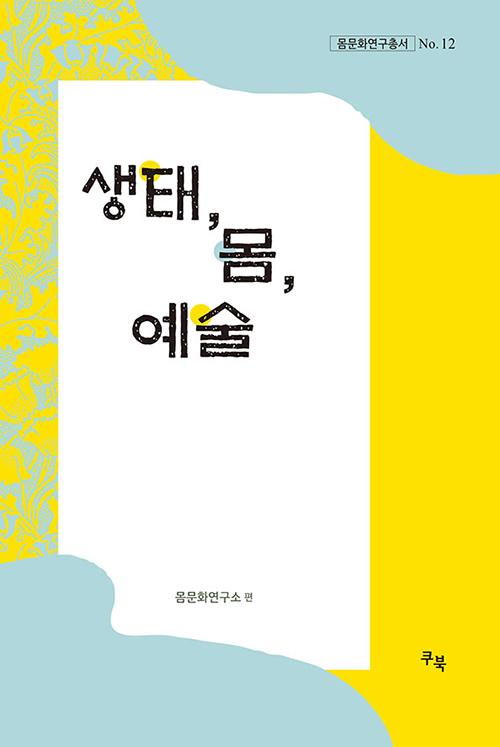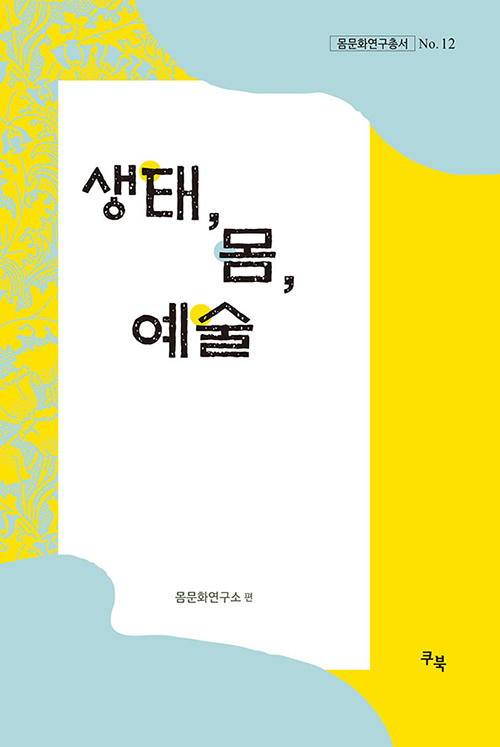fnctId=bbs,fnctNo=1279
- 글번호
- 910362
Ecology, Body, Art
- Writer
- 몸문화연구소
- View
- 90
- Date
- 2020.10.07
- 수정일
- 2024.04.03


Series Book - Ecology, Body, Art
Prior to the instability of 2019, people were generally thrilled at the opening of the new era
of artificial intelligence. This coincided with various predictions that humankind would be
destroyed if we continued ignore environmental problems such as climate change, rising sea
levels, and the destruction of the ozone layer. In 2020 due to the Covid-19 pandemic, all
regular activities stopped. The virus has allowed us to rethink the ecosystem. A book describing
the ecosystem of human life entitled Ecology, Body, Art has recently been published.
Chapter 1 of the book explains how ecological law and order provide a new paradigm for
human-centered law. Chapter 2 approaches ecological problems from the perspective of food
instead of law. The author claims that consumption has eventually led to the destruction of
the global ecosystem and that local food movements and eating less are habits required to
restore the ecosystem. Chapter 3 focuses on the relationship between life and energy in
cyberspace. It also suggests the possibility of a green digital life. Chapter 4 argues that
modern society, where the ecosystem is in crisis, needs new aesthetic sensibilities. Therefore,
the author suggests the new perspective that we all should be interested in ethical responsibility.
Chapter 5 suggests that we should consider an ecological transition. The author also criticizes
Kant's aesthetic perspectives, which dealt with only the beauty of nature and majesty as aesthetic
concepts. Chapter 6 refers to powerful natural forces that humans cannot control such as climate
change, pandemic, and fine dust. Later, the author looks at the relationship between non-human
substances and women's bodies from a new materialism perspective. Chapter 7 argues that a view
of feminism criticism is essential to deny the history of humanistic violence. Chapter 8 presents
a view of integrating life and nature based on Park Kyung-ri's poems. Chapter 9 presents
science fiction as one way to think about human life‘s uncertainty. Furthermore, it provides an outlook
on how science fiction will evolve in the future.
Prior to the instability of 2019, people were generally thrilled at the opening of the new era
of artificial intelligence. This coincided with various predictions that humankind would be
destroyed if we continued ignore environmental problems such as climate change, rising sea
levels, and the destruction of the ozone layer. In 2020 due to the Covid-19 pandemic, all
regular activities stopped. The virus has allowed us to rethink the ecosystem. A book describing
the ecosystem of human life entitled Ecology, Body, Art has recently been published.
Chapter 1 of the book explains how ecological law and order provide a new paradigm for
human-centered law. Chapter 2 approaches ecological problems from the perspective of food
instead of law. The author claims that consumption has eventually led to the destruction of
the global ecosystem and that local food movements and eating less are habits required to
restore the ecosystem. Chapter 3 focuses on the relationship between life and energy in
cyberspace. It also suggests the possibility of a green digital life. Chapter 4 argues that
modern society, where the ecosystem is in crisis, needs new aesthetic sensibilities. Therefore,
the author suggests the new perspective that we all should be interested in ethical responsibility.
Chapter 5 suggests that we should consider an ecological transition. The author also criticizes
Kant's aesthetic perspectives, which dealt with only the beauty of nature and majesty as aesthetic
concepts. Chapter 6 refers to powerful natural forces that humans cannot control such as climate
change, pandemic, and fine dust. Later, the author looks at the relationship between non-human
substances and women's bodies from a new materialism perspective. Chapter 7 argues that a view
of feminism criticism is essential to deny the history of humanistic violence. Chapter 8 presents
a view of integrating life and nature based on Park Kyung-ri's poems. Chapter 9 presents
science fiction as one way to think about human life‘s uncertainty. Furthermore, it provides an outlook
on how science fiction will evolve in the future.
